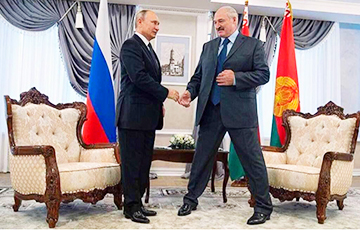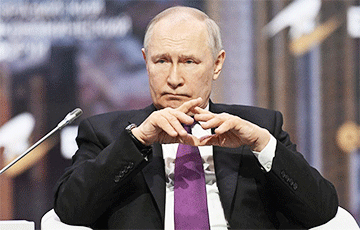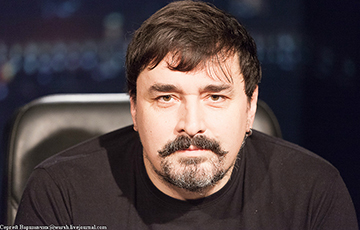Lukashenka Is Presented His Last Bill, Economist Says
- 15.07.2019, 13:18
- 3,169

The Belarusian authorities are like the boiling frog.
July 5, Ambassador of Belarus to Russia Uladzimir Semashka said: "We won't be able to survive the tax manoeuvre".
"Russian refineries will buy oil for about 83-84% of the world price. We'll buy at the world price. 4-5% is enough for the refinery to operate properly, to take loans, to service them, to modernize. And here we have 16-17%. We will miss it. Therefore, we will not be able to survive the tax manoeuvre," Semashka explained his thesis.
In light of the state of the Belarusian economy, economist Leanid Zlotnikau commented to Charter97.org on the statement of the Ambassador to the Russian Federation:
- How do you assess Semashka's words about the effects of the tax manoeuvre?
- The statement is absolutely correct. We have been repeating that Belarus has no resources to repay its debts.
Our authorities have been given $5 billion a year - no matter what form it had. Either in the form of loans (I mean Russian) or in the form of cheap energy resources.
The fact is that before the collapse of the Soviet Union Belarus used to consume Russian oil, gas, metals and other resources at prices 2.5-3 times lower than the world prices. And it sent its goods to Russia at prices 2.5-3 times higher than the world ones.
After the collapse of the Soviet Union, the government of Vyacheslav Kebich did not want to lose these benefits and began to seek support from Russia. Back in December 1991, Kebich stated that Belarus allegedly "can't exist on its own". And he proposed to introduce a common ruble and launch "integration".
Lukashenka pursued the same policy line. As a result, our consumption, starting from the Soviet period and up to this moment, has been largely dependent on subsidies from Russia. Russia has been supplying us all the time.
You know, if a frog is put in tepid water which is then brought to a boil slowly, it will not perceive the danger and will be cooked to death. I draw the parallel with the Belarusian authorities, meaning dependence on subsidies and "help" from Russia.
And now it is the moment when Russia refuses to feed Belarus for some reason. Of course, not to give up it completely, but to ensure the same level of consumption provided by its subsidies in different forms.
I think Semashka knew long ago that we found ourselves in such a situation. Does he live under a rock? He knew it. I guess as well as Lukashenka. But the leaders pretended and Lukashenka might believe that we were so "fluffy," but Russia suddenly began to trip.
But in fact, our authorities have no right to require of Russia the provision of our necessary standard of living. Then Russia has really presented Lukashenka and his officials the last bill: you should serve us in one state.
The situation is as follows: on the one hand, they do not want to serve in one state, and on the other hand, we will not outlive this tax manoeuvre.
- There is a proverb: "A chain fails at its weakest link". What sectors of the economy and population groups can be the first to fall victim to the tax manoeuvre?
- The thing is that the tax manoeuvre causes a drop in income of the whole country.
There is no objective approach here. It will simply entail a redistribution of income within the country.
Those in power and close to power will not want to sacrifice anything. Their income may remain the same. Redistribution will occur at the expense of the "black mass".
Of course, Lukashenka is trying to curb the situation, but it is complicated. We can't repay loans.
In fact, the situation is even more complicated than I have outlined. We ate out not only Russian subsidies. The share of Russia in the external debt is now 40-45 per cent. And the remaining $40 billion has been wasted on "modernization". And it also must also be repaid.
The situation is much more severe than the loss of export duties from Russian oil. Russia has only slightly decreased its subsidies from $5 billion to $4 billion, but today we cannot repay our external debts. In the course of time, this $4 billion will be gone.
At that, we owe more than 20 billion dollars, not to Russia. In addition, There is another debt Russia requires us to repay. Russia has built the Astravets NPP at its expense. At first, when the financing agreement was signed, Russia offered us to invest at least a billion out of eleven. And Belarus has invested... by borrowing it from Russia as well. And why should it waive it?
Since 2021, whatever it happens to the nuclear power plant, Belarus must repay its debt. Something has already been repaid, but the interest rate is increasing. On average, it will worth other $10 billion for the NPP. Given all this, Russia will get tough with our authorities.
The Belarusian the government has eaten everything out... And it will be hard to solve the problem. This is about the situation. Actions to take are another issue.
- And what to do, Leanid Kanstanynavich?
- Do you remember your question about the weakest point? What is the weakest point that keeps the country's GDP from growing? Why is our economy so inefficient?
Even the standard of living we have lags behind one of our neighbours, Lithuania and Poland, which have joined the EU and increased their income per capita.
Why have we lagged behind even with Russian subsidies?
Our social system is outdated and does not contribute to the economy.
The weakest point is that power and property have merged. The government controls all the property and has poor performance of it. It does not know how to do it. Meanwhile, it tries to make business give as much to the state as possible.
In general, we have an Asian system when tyrants and rulers of the Asian type believe that owners should serve them. Owners should work for them, share profits. And tyrants punish them if they believe they are not obedient enough or do not share enough.
Such an economy is not efficient today. This is the key factor. If the authorities do not separate from the property, Belarus will have no future.
It means that the president has no right to bother the price policy, to decide what to produce, etc. The business should do it. And the state should only ensure compliance with legal rules. That's it.
If the authorities start to "care" about what people should eat and what apartments to live in, the country will not get anything.
Let's take Venezuela as an example. The tax manoeuvre does not affect it. It lives on oil. It takes the first place in oil reserves in the region and one of the first in the world. But Hugo Chavez started building "socialism of the 21st century". And what do we see? What is the result?
And we "build socialism" as well. I hope the analogy is clear.











